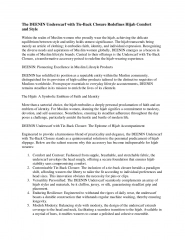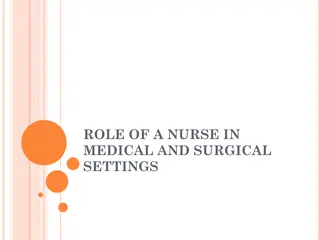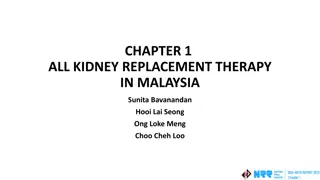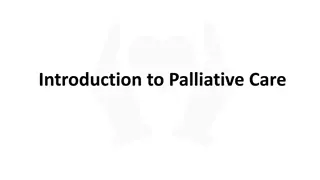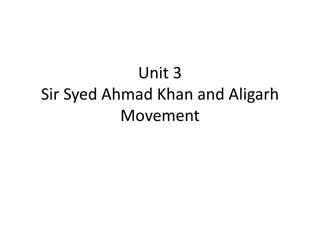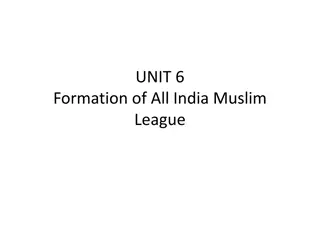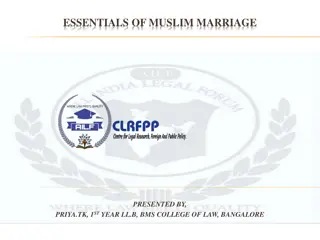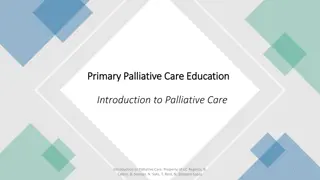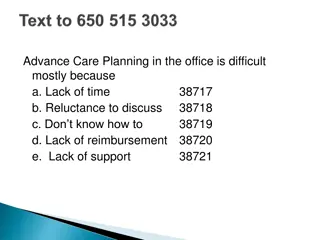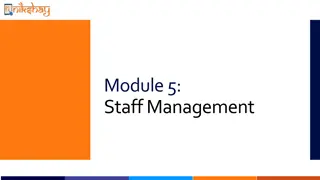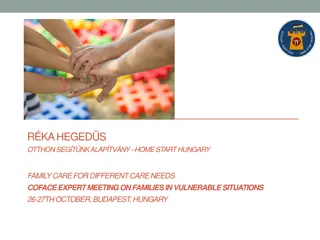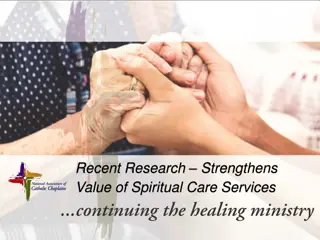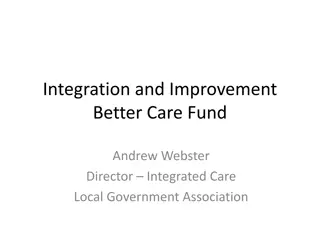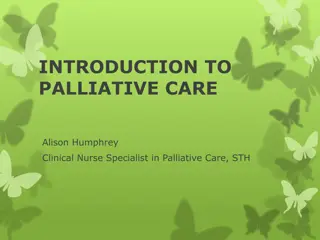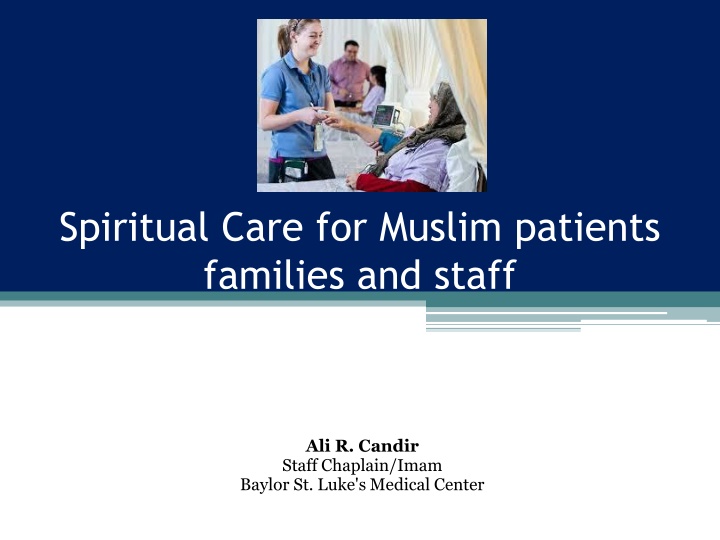
Spiritual Care for Muslim Patients and Families
Learn about the basic tenets of Islam, religious/spiritual practices, and key aspects of providing spiritual care for Muslim patients, families, and staff. Explore the common requests, cultural approaches, and essential knowledge needed to support Muslim individuals in healthcare settings.
Download Presentation

Please find below an Image/Link to download the presentation.
The content on the website is provided AS IS for your information and personal use only. It may not be sold, licensed, or shared on other websites without obtaining consent from the author. If you encounter any issues during the download, it is possible that the publisher has removed the file from their server.
You are allowed to download the files provided on this website for personal or commercial use, subject to the condition that they are used lawfully. All files are the property of their respective owners.
The content on the website is provided AS IS for your information and personal use only. It may not be sold, licensed, or shared on other websites without obtaining consent from the author.
E N D
Presentation Transcript
Spiritual Care for Muslim patients families and staff Ali R. Candir Staff Chaplain/Imam Baylor St. Luke's Medical Center
Learning Objectives Basic tenets of Islam and religious/spiritual practices Common requests of Muslim patients, families and staff Approaches to patients that demonstrate cultural and spiritual humility and respect Sacred texts, items, and spaces available from chaplains department Religious observances provide by chaplain s department How to handle requests for imam or specific religious need while on-call Helpful numbers and names to know
Basic tenets of Muslim faith Six Pillars of Faith 1. Allah 2. Angels 3. Revealed books 4. Prophets 5. Resurrection and Hereafter 6. Divine Decree
Key religious/spiritual practices Five pillars : 1. Testimony of faith, La ilaha illallah, Muhammadun rasulullah. 2. Salat Five daily prayers 3. Sawm Fasting in Ramadan. May 15-June 15.( every year it can changeable, ten days early) 4. Zakat Charity( %2,5) , 5. Hajj Pilgrimage to Mecca.(It is necessary once in a lifetime.) Patient cases
Where do Muslims live? 62% Asia-Pacific 20% Middle East and North Africa 16% Sub-Saharan Africa The largest share: Indonesia, India, Pakistan, Bangladesh PEW Forum 2009
United States 2,454,000 (<1%) Argentina 784,000 Canada 657,000 Brazil 191,000 Mexico 110,000 PEW Forum 2009 Map: Distribution of Muslim Population in the Americas
American-Muslims 3.3 million in the U.S. 1% of the total population Muslim Americans are the most racially diverse religious group: 30% White 23% African-American 21% Asian 18% Other/Mixed 6% Hispanic
Quran Role of the Quran in Muslim s life A universal language to connect with faith. Soothing effect Healing We have sent down in the Quran that which is healing and a mercy to those who believe. (Q 17:82)
All Prophets &Hz Muhammad (SAV) Role model/Perfect human being Sunna as source of religion Profound love and respect for him, his family and companions
There are two blessings which many people do not appreciate: health and leisure. Prophet Muhammad (pbuh)
Suffering Suffering and illness as life s tests and trials Belief in Hereafter Reward Purification/Spiritual elevation Divine Decree/Will. Destiny of the person. Outer and inner realities of the things perhaps you hate a thing and it is good for you; and perhaps you love a thing and it is bad for you. And Allah Knows, while you know not. (Q 2:216)
For every misfortune, illness, anxiety, grief or hurt that afflicts a believer even the hurt caused by the pricking of a thorn God wipes off his sins and his sins fall away from him as leaves fall from a tree.
Suffering We found him (Prophet Job) full of patience and constancy. How excellent a servant! (Q 38:44) Sabr Patience Seeking cure and healing Maintaining hope Praying Remembering God Read/Listen to the Quran Asking for forgiveness Rights of others. Especially when dying.
Gods role. And when I am ill, it is [God] who cures me. (Q 26:80) Illness and reward Healing through du a(prayer) and the Quran God s indirect healing through human agents Imam s role. Role of family
Visiting the Sick Well-known practice of the Prophet Prophet Muhammad mentioned it as one of the six rights of a Muslim over another Muslim Duty and not only a virtuous act One is walking in the gardens of Paradise when visiting the sick until he/she returns.
Approaches to patients that demonstrate cultural and spiritual humility and respect Privacy of a female patient: Modesty , hijab Physical contact is limited to family members/close relatives. Same gender health care provider preferred Women cover their heads, using a hijab. They may not want to take it off where there is a male presence. Allow some time before entering a female pt s room. Diversity of geographies, cultures, ethnicities also reflected in wearing styles Personal practice Q: Is there a gender issue? Can female chaplains visit male patients and vice/versa?
Dietary Rules Muslims are instructed to eat Halal food always. Majority of things are halal. Pork, its by-products and alcohol are prohibited, haram. Meat/Slaughtering way Vegetarian menu Provide info of local halal restaurants Some families may bring food from home
Possible Barriers Language: Interpreter services. Lack of cultural understanding Lack of knowledge about chaplain s role Trained Muslim chaplains Lack of awareness among Muslim community about what a chaplain could offer Who is an imam? Chaplaincy Services for Muslim Patients in New York City Hospitals. ISPU November 2010 report
If you have a Muslim patient on your unit Do not rush to make referral to Muslim chaplain
Local patients Language barrier is minimum Ask if they are connected to a local faith community: local mosque or imam Large family presence Take extra time to educate: Who am I? What am I here to offer? Observant pts -> Ask if they want somebody recite Quran for them Masjid Friday prayers Availability of an imam. Quran and prayer books If pt wearing hijab, availability of hijabs
International patients Language barrier most likely. Use an interpreter via phone. Ask RN if none in the room. Do they have family or friends in Atlanta? Take extra time to educate about chaplain s role: Who am I? What am I here to offer? Availability of the masjid (prayer room). International funeral shipping ( el Farook Masjid)
Masjid (Prayer room) Masjid is a great gift Spirit of community. Help patients and families to connect with their spirituality and community. (Two visits from this week.) Open 7/24 Friday congregational prayer, Jumu a 1:50 pm ( it can changeable)
Religious items/observances provided by our department Quran copies Prayer books Prayer mats Spiritual Care brochure in Arabic Hijab Ramadan iftar celebrations( in mounth of Ranazan) Gift bags
How to handle requests for imam or specific religious need while on-call Local patients Patients from other countries International Services
Helpful numbers/names/apps Refer to the Magic Book aka On-call Resource Guide App: Muslim pro for prayer times and Qibla
How to offer a prayer? Beginning with In the Name of God, The Compassionate, The Merciful. If you are comfortable saying so Prayer Book, page 121 Chaplain Guidebook, page 35 Referring to God: Merciful, Compassionate, Our Creator, Our Lord, Loving, Kind, Healer Do not use Father or when referring to pt, Your child Praying in Jesus name Raising palms Not holding hands Q: How would you respond if you received a request for Quran recitation/reading?
Rituals: Newborn baby 1. Prayer Call (Adhan)is said by imam/elderly/parent to baby s ear after birth and his/her name repeated three times. 2. Circumcision of male babies 3. Putting a soft date in baby s mouth/lips 4. Cutting baby s hair
Rituals: Death He Who has created death and life, so that He may try you (and demonstrate to yourselves) which of you is better in deeds. [Quran 67:2] Uttering Shahada the testimony of faith as the last words La ilaha illallah Recitation of the Quran in Arabic. Chapter 36. Turning the patient towards the Ka ba Closing the deceased s eyes. Lower jaw. Covering the whole body. Washing, enshrouding, and burial (no cremation) as soon as possible. Helping family with speedy paperwork. Condolences: Saying to family and loved ones, To God we belong and to Him is our return.
Islamic Bioethics in Brief AUTOPSY: The body of the deceased patient should be treated with respect as he/she were alive. It is not common, rather for legal purposes. ORGAN DONATION: Permitted, personal choice. ABORTION:Prohibited except if mother s health is in danger. Another ruling permits it until 120 days. Does the ensoulment mean the beginning of biological life? DNR: Personal choice. Assisted suicide and euthanasia are prohibited. WITHDRAWING LIFE SUPPORT: It is permitted to stop medical treatment when assessed no hope of recovery. MILK BANK: Breastfeeding is encouraged. Use of milk banks is not common. Ruling on this differs.
Useful expressions in Arabic Ahlan wa sahlan/Marhaban Welcome/Hello As salamu alaikum Wa alaikum salam (response) Peace be with you Shukran / Af-wan Ma as salama (when leaving the room) Thank you / You are welcome Safety be with you. Allahu yashfeeka Ramadan Mubarak / Kareem May God heal you. Blessed Ramadan! Eid Mubarak Blessed Festival! InshaAllah God willing Alhamdu lillah Praise be to God
Please keep in mind that Always keep in mind the huge cultural, ethnic, geographical diversity of Muslims Ask the patient about their preferences in terms of religious observance Remember that hospitality is a key value and most of times, your Muslim patients and families will be very receptive of your visit You have a tremendous opportunity to establish rapport thanks to your sensitivity and cultural competence skills Your Muslim patients only needs and deserves your compassion, respect, supportive presence, and prayers

